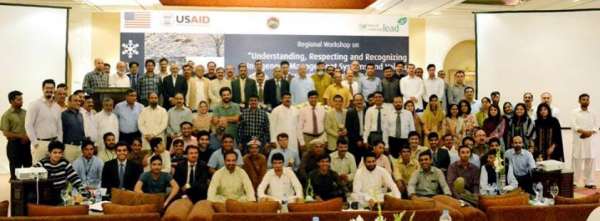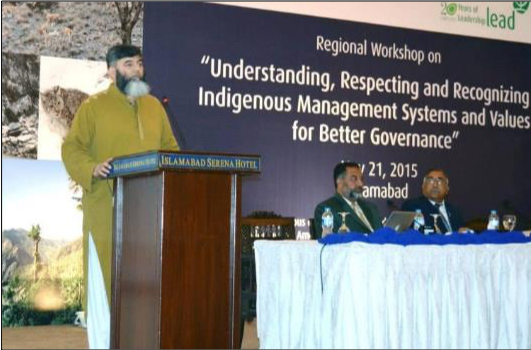First published on 08/29/2015, and last updated on 03/29/2018
By: Fereshteh Sabetian, Regional coordinator for West and Central Asia, Cenesta/ICCA Consortium
The civil society organisation Leadership for Environment and Development (LEAD) Pakistan organized a workshop on “Understanding, Respecting and Recognizing Indigenous Management Systems and Values for Better Governance” on 21 May 2015 in Islamabad, Pakistan. Together with the Department of Wildlife of the province of Khyber Pakhtunkhwa, LEAD has established a USAID funded project which is focused on the indigenous communities and ICCAs in Chitral protected area. Therefore, this important workshop consisted of provincial and national government officials, members of the indigenous community of Kalash in Chitral, members of other organisations as well as guest speakers from Nepal and Iran.
Tahir Rasheed, General Manager of LEAD Pakistan opened the workshop by requesting a minute of silence and then prayer for the victims of the recent earthquakes in Nepal. He then explained the main objective of this workshop which was to highlight the role of ICCAs in policy making, recognition and support of traditional systems in Pakistan. To further explain the importance of ICCAs for wildlife conservation, Rasheed gave examples of the Kalash indigenous community which have kept their traditions and used indigenous knowledge to protect nature in the Chitral region. Other speakers, Muhammad Mumtaz Malik from the University of Haripur, Ghazi Azimati Isa from Pakistan Poverty Elimination Fund (PPEF) and Malik Amin Aslam from Green Growth Initiatives spoke about challenges and opportunities in protected areas in Pakistan.
The second part of the workshop was from a regional perspective, in which Jailab Rai from Forest Action in Nepal, and Salman Rassouli and Fereshteh Sabetian from the Centre for Sustainable Development (CENESTA) in Iran explained the experiences and lessons learned in their respective areas. Rai spoke about the rich cultural diversity of Nepal, different approaches to nature conservation and governance, and methods of collaboration between indigenous peoples, local communities and the government of Nepal. After this, the participants from Iran spoke about the re-empowerment of indigenous nomadic tribes and local communities in order to eliminate poverty, starting with the recognition of their territories as ICCAs. They gave a successful example of participatory zoning in the Nayband Marine and Coastal Park in the south of Iran, and also explained about the activities conducted in Sistan and Baluchistan provinces of Iran, which share a border with the Baluchistan region in Pakistan.
In the technical part of the workshop, many government officials gave talks about the government’s responsibilities towards ICCAs. A member of the indigenous community read a statement of their requests from policy makers in Urdu, and at the end, the representative from USAID explained GEF support for ICCA programmes. Unlike the first two parts which were in English, the third section of the workshop was in Urdu. This helped improve communication between the government officials and the members of the indigenous communities. However, the need for translators between foreign guests and the indigenous peoples was felt. Also the workshop could have enjoyed greater participation of the local indigenous communities by giving them more chance to express their views.
For the second day of the programme, Tahir Rasheed and the guests from Iran and Nepal were invited to the University of Arid Agriculture and Fatima Jinnah Women’s University, both in Rawalpindi, to participate in programmes for the “International Day of Biological Diversity” and to speak about ICCAS.

The participants of the Workshop © LEAD Pakistan
